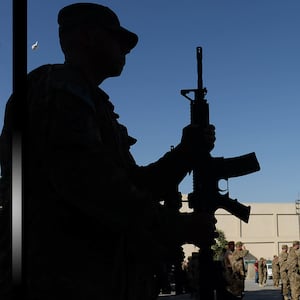In a speech the first week of June, Sen. Dick Durbin (D-IL) asserted the need to close Guantanamo Bay prison, citing the extraordinary costs of keeping the prison open and the lack of justice for 9/11 families as a result of the long drawn out military commissions.
Senator Durbin has expressed similar sentiments before, for example, in a September 2022 interview with The Wall Street Journal when he stated that “holding people without charge or trial for years on end cannot be reconciled with the values we espouse as a nation, and has deprived the victims of 9/11 and their families of any semblance of justice or closure.”
Conspicuously absent from these statements, however, were any clear calls for justice for the men who remain detained. This has been a consistent theme in official and/or mainstream narratives around Guantanamo—neglecting to call for justice for the men detained, as if this is an unreasonable demand that would diminish the legitimacy of the overall call to close the facility.
Guantanamo was not created as a place for justice—especially not for the Muslim men detained behind its bars.
Just as soon as these men were captured, they were labeled as suspected terrorists—thus precluding any ability for them to be seen as innocent until proven guilty. From the long years spent behind bars awaiting charges and convictions that never came, to torture, and even murder, the U.S. government has, at every conceivable step of the way, sought to entrench the perception of their inherent guilt. This perception has been shaped by the deployment of strategic narratives that have been carefully constructed and maintained to paint the men as irredeemable terrorists.
Even for the men who are currently in plea deal negotiations, or the few who have been charged and convicted, the establishment of a faux legal system was designed to masquerade the process as justice.
Since the opening of the prison at Guantanamo, numerous Supreme Court cases have been won granting the detainees the narrow right to challenge their detention through habeas corpus.
In 2009, Lakhdar Boumediene, the lead plaintiff in the famous case of Boumediene v. Bush, was ordered released by a federal court and was subsequently transferred to France. In the Department of Justice’s press release announcing Boumediene’s departure from Guantanamo, there were no details about his case, much less anything that would cast doubt on his guilt or vindicate him.
Guantanamo, after all, is fundamentally a place that consigns even the men lucky enough to get out with a degree of guilt hanging over their heads. Additionally, the law, as this case demonstrates, could only go so far to guarantee justice—particularly for those it was never meant to protect.
Abdul Latif Nasser was a Moroccan man who spent nearly 20 years at Guantanamo Bay prison before being the first prisoner to be released by President Joe Biden. Though Nasser had been cleared for release in 2016, administrative delays by the Obama administration and the fact that Trump vowed to keep the prison open (releasing just one prisoner during his term) meant that he ended up spending an additional five years detained. When Nasser was finally released, in July 2021—without being charged or convicted—the Department of Defense issued a press release stating merely that his detention “no longer remained necessary to protect against a continuing significant threat to the national security of the United States.” After almost 20 years, in other words, Nasser left Guantanamo stained—with eternal unquestionable guilt stamped on his back, and no acknowledgement of his victimization.
In February 2016, with his presidency winding down, President Barack Obama delivered a speech on his plan to close Guantanamo. Under Obama, close to 150 Guantanamo prisoners were transferred out, giving the administration ample evidence, data, and knowledge as to who the men detained really were. But rather than take actual responsibility for the harm inflicted on Guantanamo’s Muslim prisoners, the need to close the prison was shifted back onto Muslims being inherently terroristic and vengeful. Nowhere in Obama’s speech was there a recognition of the violence wrought on Muslims—for whom justice needed to be secured, if the U.S. were to uphold the values upon which it claims to stand.
Though President Biden has been relatively silent on the plan to close Guantanamo, he has nevertheless received urging in publications including The New York Times, whose editorial board opinion piece, titled “Biden Can Close the Extrajudicial Prison at Guantánamo,” was published in April 2023. The opinion piece imbues the subject with a sense of urgency, given what could be his only term as President. However, justice for the Muslim men detained remained absent from the call.
As Guantanamo Bay prison moves towards its 22nd year in operation, we should continue to call for the prison’s closure. However, we should also robustly challenge how the Islamophobic discourse surrounding Guantanamo has perpetuated a narrative of unequivocal guilt, even after the men have been transferred. The U.S. cannot absolve itself from responsibility just because it's managed to so thoroughly criminalize the men that their existence has been rendered inconvenient and disposable.
If justice is an actual concern of the U.S. government, then there must be accountability for those who the U.S. has disregarded as justified collateral damage to protect the American “homeland.” Guantanamo's men cannot be made visible when it comes to punishment, yet invisible when it comes to justice.
Moreover, injustice has never been and will never be a means towards obtaining justice—because justice cannot be granted towards one injured party at the expense of another. Calls to close the prison must clearly articulate this to manifest justice that is long past due for Guantanamo’s indefinitely detained men.









